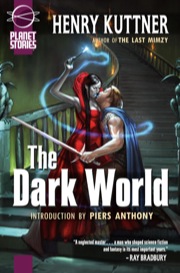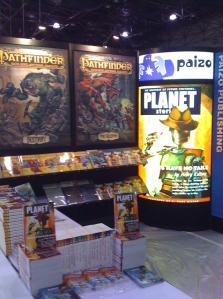Erik’s Note: I recently composed this for my personal blog, Paperback Flash, but I figured it would also be interesting to readers of the official Planet Stories blog, since it’s about one of the most important books of one of our most important writers, C. L. Moore. Enjoy!

Catherine Lucille Moore (1911 – 1987) was one of the finest fantasy and science fiction writers of the Pulp Era, contributing two characters of historical significance in the form of Jirel of Joiry, the first female sword & sorcery protagonist and Northwest Smith, a spacefaring scoundrel who very likely served as a template for Han Solo and Indiana Jones. Later, her collaborations with husband Henry Kuttner (often published under the byline Lewis Padgett) would go on to become bedrock classics of the genre. Moore is a member of the Science Fiction Hall of Fame, and her status as one of the grand masters of the pulps is a given.
I particularly enjoy her writing, which my friend Kenneth Hite once described as “Clark Ashton Smith on Cialis.” When I first encountered her lushly described, vivid prose, I immediately thought of H. P. Lovecraft and Clark Ashton Smith, though my reading in the last few years has traced this influence even farther back to Abraham Merritt, the giant of the early 20th century whose The Moon Pool and The Ship of Ishtar (among others) cast looming shadows over the Pulp Era. Moore’s use of language and many of her themes are perhaps best described as “Merrittesque,” though her stories often involve a sensual, in some cases barely disguised sexual element that makes them stand out from many of their staid contemporaries in the Pulp Era. Though her influences are clear, C. L. Moore is very much her own writer, and a great one at that.
Here’s an example of her writing style, in this case describing a gown specially designed for the lead character of Judgment Night, Juille, the heir to a powerful galactic empire in the days leading to its inevitable fall:
The best dress designer on Cyrille seemed to be a soft-voiced, willowy woman with the pink skin and narrow, bright eyes of a race that occupied three planets circling a sun far across the outskirts of the Galaxy. She exuded impersonal deftness. One felt that she saw no faces here, was aware of no personalities. She came into the room with a smooth, silent aloofness, her eyes lowered.
But she was not servile. In her own way the woman was a great artist, and commanded her due of respect.
The composition of the new gown took place before the mirrored alcove that opened from the bedroom. Helia, her jaw set like a rock, stripped off the smart military uniform which her mistress was wearing, the spurred boots, the weapons, the shining helmet. From beneath it a shower of dark-gold hair descended. Juille stood impassive under the measuring eyes of the newcomer, her hair clouding upon her shoulders.
Now she was no longer the sexless princeling of Lyonese. The steely delicacy was about her still, and the arrogance. But the long, fine limbs and the disciplined curves of her body had a look of waxen lifelessness as she stood waiting between the new personality and the old. She was aware of a certain embarrassed resentment, suddenly, at the step she was about to take. It was humiliating to admit by that very step that the despised femininity she had repudiated all her life should be important enough to capture now.
The quality of impassivity seemed to puzzle the artist, who stood looking at her thoughtfully.
“Is there any definite effect to be achieved?” she asked after a moment, speaking in the faintly awkward third person through which all employees upon Cyrille address all patrons.
Juille swallowed a desire to answer angrily that there was not. Her state of mind confused even herself. This was her first excursion into incognito, her first conscious attempt to be—feminine; she disdained that term. She had embraced the amazon cult too wholeheartedly to admit even to herself just what she wanted or hoped from this experiment. She could not answer the dresser’s questions. She turned a smoothly muscular shoulder to the woman and said with resentfulness she tried to conceal even from herself:
“Nothing … nothing. Use your own ingenuity.”
The dresser mentally shot a keen glance upward. She was far too well-trained actually to look a patron in the face; but she had seen the uniform this one had discarded, she saw the hard, smooth symmetry of the body and from it understood enough of the unknown’s background to guess what she wanted and would not request. She would not have worked her way up a long and difficult career from and outlying planet to the position of head designer on Cyrille if she had lacked extremely sensitive perception. She narrowed her already narrow eyes and pursed speculative lips. This patron would need careful handling to persuade her to accept what she really wanted.
“A thought came to me yesterday,” she murmured in her soft, drawling voice—she cultivated the slurred accent of her native land—”while I watched the dancers on Dullai Lake. A dark gown, full of shadows and stars. I need a perfect body to compose it on, for even the elastic paint of undergarments might spoil my effect.” This was not strictly true, but it served the purpose. Juille could accept the gown now not as romance personified, but as a tribute to her own fine body.
“With permission, I shall compose that gown,” the soft voice drawled, and Juille nodded coldly.
The dresser laid both hands on a section of wall near the alcove and slid back a long panel to disclose her working apparatus. Juille stared in frank enchantment and even Helia’s feminine instincts, smothered behind a military lifetime, made her eyes gleam as she looked. The dresser’s equipment had evidently been moved into place behind the sliding panel just before her entrance, for the tall rack at one end of the opening still presented what must have been the color-selection of the last patron. Through a series of level slits the ends of almost countless fabrics in every conceivable shade of pink showed untidily. Shelves and drawers spilled more untidiness. Obviously, this artist was great enough to indulge her whims even at the expense of neatness.
She pressed a button now and the pink rainbow slid sidewise and vanished. Into its place snapped a panel exuding ends of blackness in level parallels—satin that gleamed like dark water, the black smoke of gauzes, velvet so soft it looked charred, like black ash.
The dresser moved so swiftly and deftly that her work looked like child’s play, or magic. She chose an end of dull silk and reeled out yard after billowing yard through the slot, slashed it off recklessly with a razor-sharp blade, and like a sculptor modeling in clay, molded the soft, thick stuff directly upon Juille’s body, fitting it with quick, nervous snips of her scissors and sealing the edges into one another. In less than a minute Juille was sheathed from shoulder to ankle in a gown that fitted perfectly and elastically to her skin, outlining every curve of her body and falling in soft, rich folds about her feet.
The dresser kicked away the fragments of discarded silk and was pulling out now such clouds and billows of pure shadow as seemed to engulf her in fog. Juille almost gasped as the cloud descended upon herself. It was something too sheer for cloth, certainly not a woven fabric. The dresser’s deft hand touched lightly here and there, sealing the folds of cloud in place. In a moment or two she stepped back and gestured toward the mirror.
Juille turned. This tall unknown was certainly not herself. The hard, impersonal, perfect body had suddenly taken on soft, velvet curves beneath the thick soft fabric. All about her, floating out when she moved, the shadowy billows of dimness smoked away in drapery so adroitly composed that it seemed an arrogance in itself.
“And now, one thing more,” smiled the dresser, pulling out an untidy drawer. “This—” She brought out a double handful of sequins like flashing silver dust and strewed them lavishly in the folds of floating gauze. “Turn,” she said, and Juille was enchanted to see the tiny star points cling magnetically to the cloth except for a thin, fine film of them that floated out behind her and twinkled away to nothing in midair whenever she moved.
Juille turned back to the mirror. For a moment more this was a stranger whose face looked back at her out of shining violet eyes, a face with the strength and delicacy of something finely made of steel. It was arrogant, intolerant, handsome as before, but the arrogance seemed to spring now from the knowledge of beauty.
And then she knew herself in the mirror. Only the gown was strange, and her familiar features looked incongruous above it. For the first time in her life Juille felt supremely unsure of herself. Not even the knowledge that the very stars in the Galaxy were subject to her whim could help that feeling now. She drew a long breath and faced herself in the mirror resolutely.
So far, Planet Stories has reprinted collections of C. L. Moore’s two most popular characters, Jirel of Joiry in Black God’s Kiss and Northwest Smith in Northwest of Earth: The Complete Northwest Smith. Reviews for both collections have been very positive, somewhat surprising for fiction that is closing in on being eight decades old.
A lot of the reviews highlight a specific weakness of her Jirel and Smith stories, a stylistic nuance that becomes much more pronounced when all of a given character’s adventures are collected in the same volume. The problem is this: Although Moore’s worlds are vividly realized, and her use of language and beauty of structure easily set these tales apart as classics, her classic characters don’t really do much of anything in the stories themselves. Rather, they watch as something very interesting happens to other people. They often emerge victorious against their enemies by tapping some inner strength or reserve, or taking some internal journey. Though Jirel comes armed with a sword and Northwest Smith packs his trusty heat gun, the weapons usually remain holstered and the stories are more psychological horror that action adventure.
Not so here, in Judgment Night which almost seems to have been written in reaction to that specific criticism. Far from a wallflower, Juille spends the last several chapters of the book literally blowing apart an entire planet with an unthinkably powerful super-gun. It’s a thrilling cat-and-mouse scene filled with carnage, collapsing buildings, and all sorts of entertaining mayhem.
Originally written as a two-part serial in 1943’s Astounding (edited by that titan of early SF, John W. Campbell, Jr.), Judgment Night came 10 years after Moore’s Weird Tales debut, when most of the Jirel and NWS stories were already behind her. It’s a transitional piece, of sorts, bridging the early era populated largely by her Jirel and Smith stories and her later material (much of it also published by Campbell) written in collaboration with her future husband, Henry Kuttner (the two were married in 1940, but this story shows very little if any Kuttner influence and has never been credited to him).
The legendary Gnome Press published a hardcover edition of Judgment Night in 1952, complete with an effective cover from Frank Kelly Freas. That edition also included the short stories “Paradise Street,” “Promised Land,” “The Code,” and “Heir Apparent,” a good selection of Moore’s non-series character, non-Kuttner material. The 1965 Paperback Library version I read (pictured above) lacks these stories, focusing only on the title tale.
Although I like the Gnome Press edition and the other tales included therein are worthy additions to Moore’s canon, Judgment Night easily stands on its own as a great classic of Pulp Era science fiction.
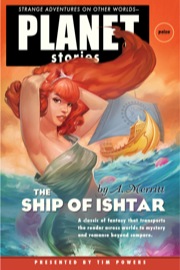 That new book I mentioned above is actually 85 years old this year, but it hasn’t been published for decades. I’m speaking of A. Merritt’s
That new book I mentioned above is actually 85 years old this year, but it hasn’t been published for decades. I’m speaking of A. Merritt’s 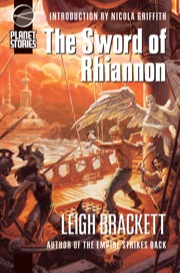
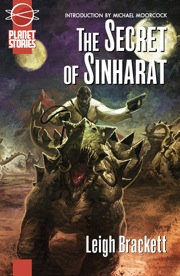 Prominent gamer Joe Kushner recently picked up the first Eric John Stark Planet Stories book,
Prominent gamer Joe Kushner recently picked up the first Eric John Stark Planet Stories book, 
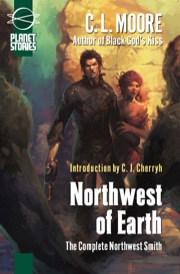
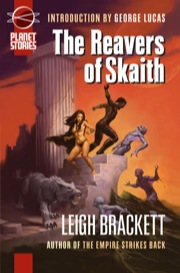
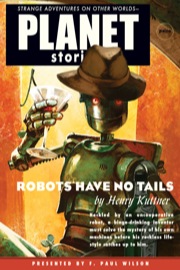 James Enge, author of the new sword and sorcery novel
James Enge, author of the new sword and sorcery novel 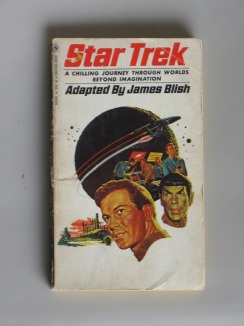

 Christofer Marley has been treacherously slain. It appears that he died in some sordid brawl, but the murder is in fact the hidden act of one faction of the divided Prometheans, secret conspirators who serve Queen Elizabeth I. Marley’s death leaves no writer to pen the magically potent plays that keep the queen on England’s throne. But his co-conspirators hope to use another playwright: a promising young talent named Will Shakespeare.
Christofer Marley has been treacherously slain. It appears that he died in some sordid brawl, but the murder is in fact the hidden act of one faction of the divided Prometheans, secret conspirators who serve Queen Elizabeth I. Marley’s death leaves no writer to pen the magically potent plays that keep the queen on England’s throne. But his co-conspirators hope to use another playwright: a promising young talent named Will Shakespeare.